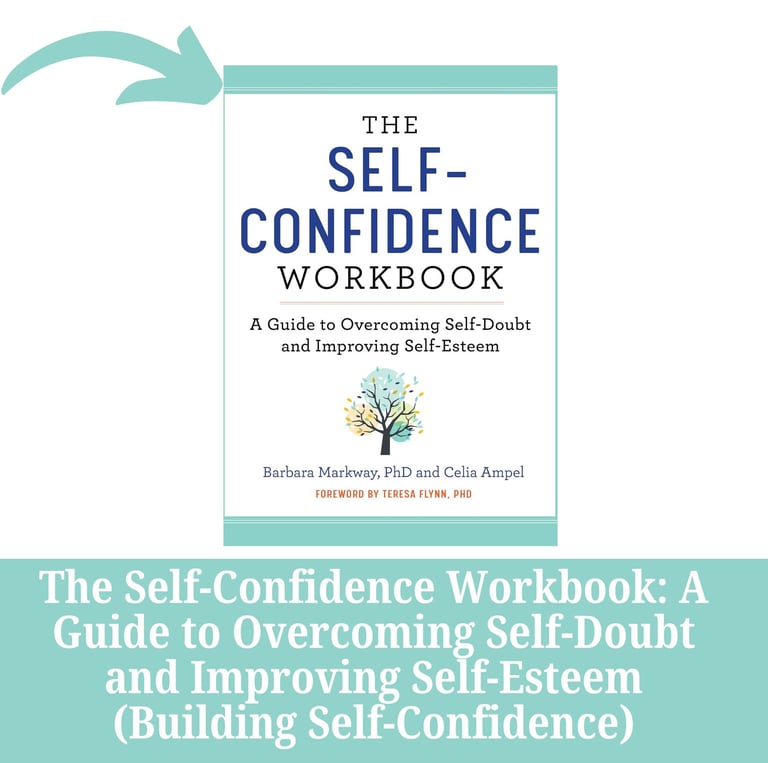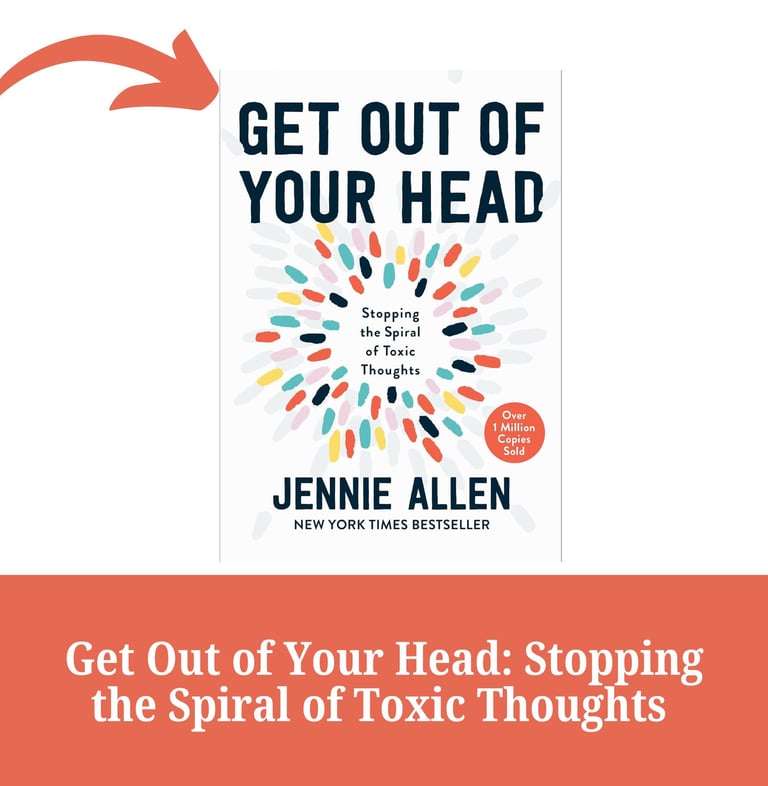How Can I Stop Obsessive Thoughts: Effective Strategies
Discover effective strategies on how can I stop obsessive thoughts. Find solutions to overcome intrusive thinking on our blog.
SELF CARE AND PERSONAL GROWTH
Shari Smith
1/1/202510 min read
As an Amazon affiliate, we earn commissions at no extra cost to you if you click our links and make a purchase.


Key Points
Intrusive thoughts are unwanted and often distressing, but they are common and don't necessarily signify a problem.
When obsessive thoughts become frequent, overwhelming, or begin to interfere with daily life, it's important to address them proactively.
Fortunately, several effective strategies can help manage and overcome obsessive thoughts.
Techniques like mindfulness meditation, Cognitive Behavioral Therapy (CBT), and lifestyle modifications can significantly impact obsessive thinking.
Understanding the root causes of obsessive thoughts, such as anxiety disorders or past trauma, is crucial for effective management.
Understanding Obsessive Thoughts
Obsessive thoughts are intrusive, unwanted ideas, images, or urges that repeatedly enter the mind, often causing significant anxiety or distress.
These thoughts can range across various themes, including fears of contamination, causing harm, inappropriate sexual content, or the need for perfect order and symmetry.
Understanding these thoughts is essential to managing the impact that they have on your daily life and your emotional well-being.
Defining Obsessive Thoughts
In psychology, obsessive thoughts are often associated with obsessive-compulsive disorder (OCD). OCD is a condition marked by recurring obsessions and compulsions that disrupt daily life.
You know those thoughts that keep popping into your head even though you really don't want them there? Like an annoying song that won't stop playing - except these aren't just annoying, they can be pretty distressing. That's what we're talking about when we say "obsessive thoughts."
These thoughts can show up in all sorts of ways. Maybe you're constantly worried about germs and can't stop thinking about getting sick. Or perhaps you keep having these scary "what if" thoughts about accidentally hurting someone, even though you'd never want to. Sometimes it might be unwanted sexual thoughts that make you super uncomfortable, or this overwhelming need to have everything perfectly lined up and organized.
The thing is, getting what these thoughts are all about is super important - it's like having a map when you're trying to navigate somewhere new. When you understand what's going on in your head, it's way easier to handle how these thoughts mess with your everyday life and your emotional health. Plus, it helps to know you're not alone in this - lots of people deal with these kinds of thoughts, even though they might not talk about it.
Common Types of Obsessive Thoughts
Understanding obsessive thoughts involves recognizing the various forms they take. Common types include:
Fear of Contamination: Persistent worries about germs, leading to excessive cleaning rituals.
Harm-Related Thoughts: Fears of unintentionally hurting oneself or others, even without intent.
Relationship Doubts: Constant questioning of a partner’s loyalty or the relationship’s validity.
Religious or Moral Intrusions: Unwanted thoughts about blasphemy or failing to adhere to moral standards.
If you’re grappling with these thoughts and asking yourself, "How can I stop obsessive thoughts?" recognizing their patterns is an essential first step.
Recognizing patterns of obsessive thoughts can feel a bit like trying to catch smoke with your bare hands. You know those moments when your mind goes on repeat, fixating on something over and over again? It's not just annoying; it can really take a toll on your well-being.
These persistent thoughts often come up at the most inconvenient times, veering into territory that makes you feel anxious or distressed.
Think about it – you might find yourself worrying incessantly about whether you’ve locked the door or if you turned off the stove, even though you know you did. Or perhaps you can’t shake that feeling of guilt about a past event, replaying it in your mind endlessly as if thinking about it enough will somehow change the outcome.
There are even those intrusive fears that seem to pop up out of nowhere, triggering a whirlwind of anxiety that makes it hard to focus on anything else.
Identifying these patterns is crucial. By unraveling the threads of these thoughts, you begin to see the bigger picture of what’s happening in your mind. It's like putting together pieces of a puzzle; once you can recognize where the pieces fit, it becomes easier to understand how they're influencing your day-to-day life.
And here's the good news: many people face similar struggles. You're definitely not in this alone! Understanding that others share this experience can be comforting and empowering as you work through your own thoughts.


Root Causes of Obsessive Thinking
The exact causes of obsessive thinking are complex, involving genetic, psychological, and environmental factors. Research suggests that OCD often runs in families, indicating a genetic predisposition.
Traumatic experiences and high-stress environments can also trigger or worsen obsessive thoughts. By understanding obsessive thoughts’ root causes, individuals can work toward effective interventions.
Psychological Contributions
Traumatic experiences often leave individuals feeling vulnerable, fostering obsessive thinking as a way to regain a sense of control.
You know how our brains can get stuck in these repetitive thought loops? A lot of times, it's because of how our minds process things. Like when we blow things way out of proportion (that's the fancy "catastrophizing" term) or see everything as all-or-nothing. These thinking patterns can really make those obsessive thoughts snowball.
And here's the thing about trauma - when we go through rough stuff, it can leave us feeling pretty exposed and vulnerable. So our brain tries to protect us by obsessing over things, thinking "if I just worry about this enough, I can control it and stay safe."
But hey, there are actually some pretty solid ways to tackle this:
Catch yourself in the act - When you notice these thoughts starting up, take a quick mental step back and ask "Is this really as bad as I'm making it out to be?"
Try the "gray area" approach - If you're stuck in black-and-white thinking, challenge yourself to find the middle ground. Life's usually more complicated than just good or bad.
Start small with letting go - Practice giving up control in tiny, safe ways. Maybe let someone else pick the restaurant or take a different route to work.
Get your feelings out - Whether it's journaling, talking to a friend, or working with a therapist, expressing those thoughts can help them lose some of their power.
Use grounding techniques - When obsessive thoughts hit, try focusing on your senses: name 5 things you can see, 4 you can touch, 3 you can hear, and so on. It helps bring you back to the present moment.
Remember, it's totally normal for our brains to do this sometimes - it's just trying to protect us, even if it's being a bit overzealous about it!
Environmental and Social Triggers
Stressful life events, such as job loss or relationship conflicts, can amplify obsessive thinking. Social interactions may also act as triggers, especially if individuals fear judgment or rejection.
You know how life can sometimes throw a bunch of curveballs your way? Whether it's losing your job or dealing with relationship drama, these stressful situations can really kick those obsessive thoughts into high gear. It's like your brain goes into overdrive trying to figure everything out.
And then there's the whole social scene - hanging out with people can sometimes be a trigger too. Maybe you're worried about saying the wrong thing, or you're constantly replaying conversations in your head thinking "Oh man, did that sound weird?"
It's especially tough when you're nervous about others judging you or not accepting you.
Here's what's really interesting though - all this shows us that dealing with obsessive thoughts isn't just about what's going on in our heads. It's also about what's happening around us.
Think of it like a garden - you can't just focus on the plants (your thoughts), you've got to look at the soil and weather too (your environment and social life).
Some down-to-earth ways to handle this:
Create some breathing room - When life gets super stressful, build in mini-breaks. Even a 10-minute walk can help clear your head.
Keep it real with your people - Let trusted friends know when you're struggling. Sometimes just saying "Hey, I'm having a rough time" can take some pressure off.
Set some boundaries - It's totally okay to say no to social stuff when you're feeling overwhelmed. Your mental peace comes first!
Break it down - When big stressors hit, chunk them into smaller, more manageable pieces. Instead of "I need a new job!" try "Today I'll update my resume."
Find your safe spaces - Whether it's a cozy coffee shop or a quiet park, have some go-to places where you can decompress when social situations get too intense.
Remember, we're all in this together - everyone's dealing with their own flavor of stress and social anxiety. Being gentle with yourself while you figure it out is totally part of the process!


Strategies for Managing Obsessive Thoughts
Effective management begins with understanding obsessive thoughts and implementing coping strategies. Here are some approaches:
Mindfulness and Meditation
So here's the thing about mindfulness - it's basically like becoming a friendly observer of your own thoughts. Instead of getting tangled up in them, you're just watching them float by, kind of like clouds in the sky. No need to judge them or beat yourself up about having them - they're just thoughts doing their thing.
The cool part? When you practice this "watching your thoughts" skill, those super sticky, obsessive thoughts start to lose their grip on you. It's like realizing "Hey, these thoughts aren't ME - they're just passing through." Pretty freeing, right?
Here are some chill ways to get started with mindfulness:
Start tiny - Even 2-3 minutes of quiet breathing counts. No need to meditate for hours like a zen master!
Make it your own - Maybe traditional meditation isn't your thing. That's cool! You can practice mindfulness while walking, doing dishes, or even taking a shower.
Use the "leaf on a stream" trick - Picture your thoughts as leaves floating down a stream. Just watch them drift by without trying to grab them.
Try the "nickname your thoughts" approach - When obsessive thoughts pop up, give them a silly name like "Oh hey, there's my worry monster again!" It helps create some distance.
Do quick body check-ins - Take mini-breaks throughout the day to notice how your body feels. It helps anchor you in the present moment.
The best part? The more you practice this stuff, the more natural it becomes. You might notice yourself feeling more peaceful, and those intrusive thoughts that used to feel like a tsunami start feeling more like little waves - still there, but way more manageable.
Remember, you don't have to be perfect at this! It's called a practice for a reason. Some days you'll rock it, other days not so much, and that's totally okay.


Cognitive Behavioral Therapy
Let's talk about CBT in a more casual way - think of it as your brain's personal trainer. It's one of the most tried-and-true ways to handle OCD and those sticky obsessive thoughts. Here's what it's all about:
Think of it like learning to be a detective of your own mind. You learn to spot what triggers those obsessive thoughts (like "Aha! This always happens when I'm stressed about work"), and then you build up a toolkit of different ways to respond. Instead of getting stuck in the same old thought patterns, you're learning new moves.
Some practical ways to use CBT thinking:
Play thought detective - Start noticing when and where these thoughts pop up
Question your thoughts - Learn to ask "Is this thought actually helping me?"
Try new responses - If your usual response isn't helping, experiment with different approaches
Build your confidence - Each time you try a new way of handling things, you're getting stronger
Practice self-compassion - Remember, you're learning new skills, and that takes time


Lifestyle Changes
Here's the real talk about taking care of yourself when dealing with obsessive thoughts - it's all connected! Just like a car needs good fuel to run smoothly, your brain needs the right support to stay balanced.
Some down-to-earth ways to make this happen:
Move your body in ways that feel good:
Quick walks when you're feeling antsy
Gentle stretching
Whatever movement brings you joy
Feed your brain right:
Keep some easy healthy snacks around
Stay hydrated
Don't stress about being perfect with food
Get your sleep game on point:
Create a chill bedtime routine
Try to keep regular sleep hours
Make your bedroom a comfy space
Structure your day:
Create simple routines that work for you
Build in breaks
Include things you actually look forward to
Remember, these changes don't have to be huge - even small tweaks can make a big difference in how you feel and how you handle those obsessive thoughts!


When to Seek Professional Help
While self-help strategies are valuable, professional guidance is crucial when obsessive thoughts interfere with daily life. Recognizing the signs—such as persistent anxiety, compulsive behaviors, or significant distress—is essential for seeking timely intervention. Therapists specializing in OCD can provide tailored treatments, enhancing the understanding of obsessive thoughts and how to address them.
Conclusion
Understanding obsessive thoughts is the first step toward managing their influence on mental health. By recognizing their nature, implementing coping strategies, and seeking professional help when needed, individuals can regain control and reduce the distress caused by these intrusive patterns. Remember, understanding obsessive thoughts is not just about combating their effects but also about fostering compassion for oneself and the journey toward well-being. The question "How can I stop obsessive thoughts?" is one many face, and with the right approach, it’s possible to find relief and healing.
Resources:
PTSD https://adaa.org/understanding-anxiety/posttraumatic-stress-disorder-ptsd












